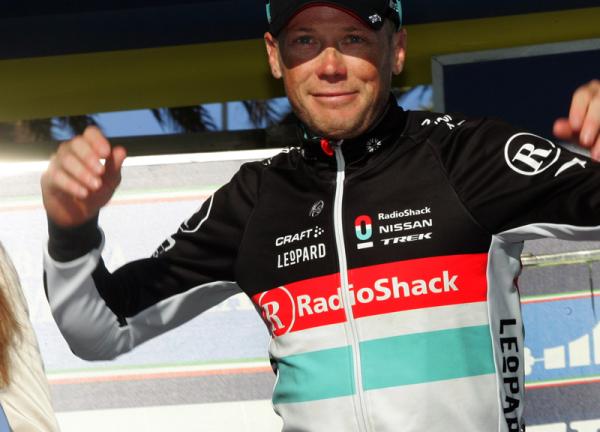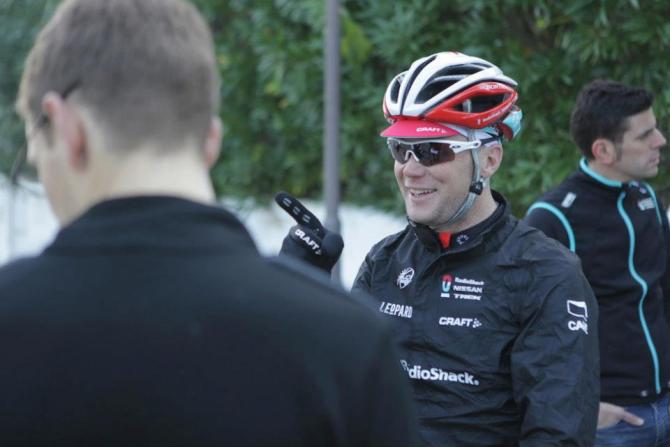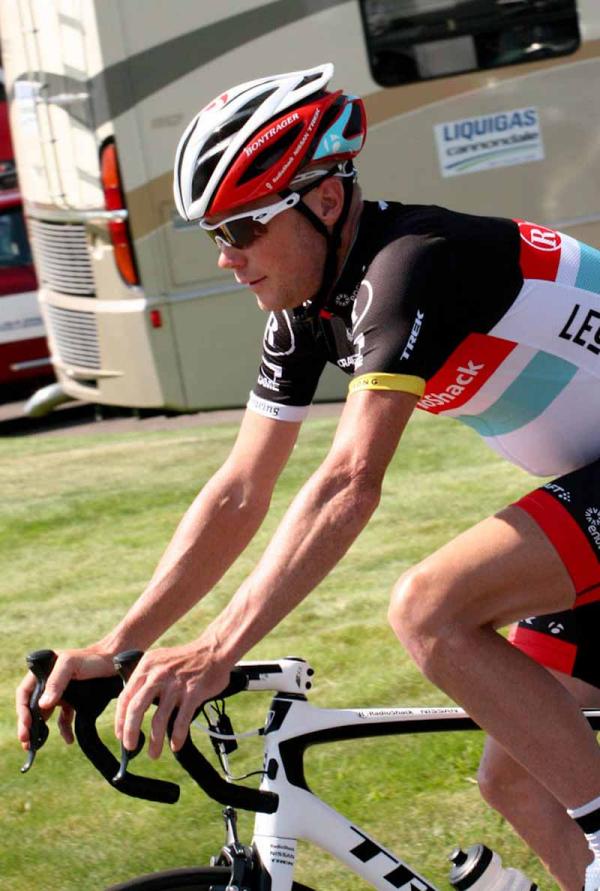Exclusive Interview: Chris Horner on his career, Armstrong and pro cycling
US veteran talks about Armstrong, dope testing and his desire to race



It's early evening in Javea, Spain and by the side of the Radioshack team bus, Chris Horner nestles into a handful of chocolate biscuits and two cans of Coca Cola. While his teammates are in their rooms surfing the internet and lounging around, "Redneck" -as he's affectionately known, is chatting with the team's mechanics. Wrapped in the comfort of the team's December training camp, the veteran American in his element. He loves bike racing, he lives for cycling and at the age of 41 he shows no sign of slowing down.
It's a somewhat sobering thought but Horner is now the US's most successful rider of the last 20 years. With USADA's case against Armstrong having gutted the annals of America's recent cycling past, Horner, with his 60-odd wins and no sanction to his name, stands as the next best thing since Greg LeMond. Statistically speaking at any rate.
With a pro career that stretches back to the mid 90s and a tapestry of teams from Saturn, FDJ, Mercury, Webcor, Saunier Duval, Lotto, Astana and RadioShack, Horner has witnessed the sport's highs and lows from the front passenger seat. And none of that seems to have dented his enthusiasm.
As he tucks into biscuit after biscuit, he clearly has the appetite for more than just snacks.
"I don't have any plans on stopping so we'll just have to see how the season goes," he says later in the evening, a broad childish grin permeating from under his team cap.
"It's been a fun career. I've no plans of retiring at the end of the year. I plan on going until I have an injury that keeps me from going on or age catches up with me. I know it will. But I'll continue to go on for as many years as I can. I love the sport, I love doing it. The only part I hate is the traveling on flights to Europe."
"The sport itself is fantastic," he adds with an almost contagious smile.
The latest race content, interviews, features, reviews and expert buying guides, direct to your inbox!
"The feeling you have when you finally reach your peak after so much dedication and sacrifice... and to get a win, and I'm old enough now to even enjoy not so much winning but just having good form, is incredible."
Horner is somewhat of an enigma, a relic to some extent. For years, he was seen as a useful super domestique, plucky in spirit, and capable of the odd flash of brilliance, but more often than not a dependable climber designated to assist others. That assessment shifted when he became a top 10 rider in the Tour de France in 2010 and a year later won the Tour of California. His palmares hit a plateau somewhat in the last two seasons, but he still managed 13th in last year's Tour de France and second in a demanding Tirreno-Adriatico behind Vincenzo Nibali. Sixth at the Tour of California after a poor time trial was a disappointment, however he was arguably the strongest rider in the race.
The devil wears USADA
While Horner's trajectory of career results has improved, so has the microscopic focus on cycling's dirty past.
USADA's Reasoned Decision stripped away not just a chronicle of results but a vaunted footing under a generation of US riders. Vande Velde, Leipheimer, Zabriskie, Danielson and others were granted leniency and six-month bans in the off-season, for testifying against Armstrong and admitting to their own doping, while Michael Barry and George Hincapie were even allowed to serve out their careers before admitting to their systematic doping.
Horner's name was not mentioned in USADA's 1000-page report. He remains almost an exception: a veteran US rider relatively untouched by doping scandal. Guilt by association these days seems flimsy.
"I've been around the sport for a long time. The sport deserves a lot more than what it was getting," Horner says when discussing the last few months reportage.
"It's complicated, it's difficult but at a certain point you just don't turn on your phone or go on Cyclingnews or Velonews or anything like that. It's easier to go for a hike and I think most professionals saw it the same way."
He's certainly not alone. While some riders have taken to social media and Twitter and voiced approval of USADA's actions - albeit some appear to pander to public opinion rather than provide honest appraisal - there are riders, clean riders, who think that the continued reportage of doping has harmed the sport.
"It sounds like you don't think the report should have come out?" Horner is asked.
"No I didn't say that," he replies. The press has to put out what's news, and it's certainly news. But it doesn't mean I have to read it. I certainly got my fill of it and saw what came out of it directly and right away."
"It will be interesting to see how the fans will continue to watch the racing, everything. This affects the whole world of cycling, which is my world."
Armstrong's legacy
But when the subject of Armstrong comes up, Horner continues the supportive line that he has walked for the last two or three years.
It wasn't always this way though. Before Armstrong signed with Astana in 2009, he and Horner appeared at different spectrums. Horner would occasionally dish out veiled comments about the 'preparation' of the Tour contenders during the Armstrong era, and when the two began racing with each other in Astana colours, it looked as though a confrontation would develop.
In fact the opposite happened. The two appeared to warm to each other and Horner has since changed his public declarations.
"Did he test positive?" he replies when asked about Armstrong's case with USADA.
Nowadays such a response leaves most people cringing. Armstrong did test positive for a steroid in 1999 and was given a post-dated exemption form from the UCI. But Horner continues.
"Look, I'm certainly old enough and wise enough to understand the magnitude of the situation, but in the end he's still getting prosecuted with no positive test. A lot of guys say they saw him and a lot say he did this and he did that, but I look at it and say: 'USADA, WADA, UCI, they're saying that the tests are worthless.' So do you take all the tests, 500, 1000, I don't know the number I've done in my own career and you basically say, that you took them for no reason?"
It's a neat side step from the issue, but Marion Jones also never tested positive and those fighting for clean sport would argue that any measure taken by anti-doping authorities – be it legal and fair - was a benefit for sport.
"Certainly in my younger years it was part [of conversations]... and it was so much on your mind what one rider was doing and was winning races. There were a lot of times when you're younger and it used up so much time and energy and so much negative energy. You're going out there training and you're asking yourself why should I train? But in the end at some point in time, you've just got to stop asking yourself how someone else is coming to a bike race and just start worrying about yourself. If a rider's passed the test he's won the race."
"And again I understand and I'm clear on how much information is out there on what Lance is said to have done but I'm also clear on the fact that he's passed all of his tests. Are you supposed to go back and erase those memories? I remember the 2005 Tour de France and Lance was the best guy there and he past all the tests and won the Tour. I'm not going to debate if he won, he was there, he won and passed the tests."
So if a cheat passes all tests, that's good enough? What about retrospective testing, testimony and accountability?
"It's the UCI's job, it's WADA's job, it's USADA's job to come up with a test so riders can't cheat. If they find the guys who cheated then those guys have to go, it's that simple," Horner said.
"Maybe USADA have found the guys who have cheated but.... for me, you won the race (if) you passed the test. Lance won seven Tours de France and that's what I saw and the moments I enjoyed and that the way it's going to stay."
It's clear that Horner doesn't feel cheated by riders in his generation who have broken the rules and not been caught and when asked if Armstrong has been victimized, he puts forward his case.
"There's no doubt about it. He's certainly been victimized because he's the most important cyclist in the world today. Certainly I believe they looked at him and evidently they weren't interested in the other 15 or 20 riders who were interviewed because those guys are retired or kept some of their results so they were going after Lance and victimizing Lance."
Six-month suspensions for riders who cooperated with USADA highlight two points: Firstly, if you cooperate with an investigation, a level of leniency is possible. However, riders were also allowed to continue racing after their suspensions were at the very least discussed. During the Tour de France, news broke that several riders had cooperated and would receive six-month bans. Cue headlines, pandemonium at team buses and the frantic issuing of press releases.
But the riders continued to race and made a series of "no comments" to the press. A number of them were omitted from the Olympic team yet carried on racing and being successful at the Tour of Colorado and the Tour of Utah. USADA and the riders' teams allowed them to jump on podiums, take wins and wave to crowds while the suspensions sat in an office in-tray.
Horner points out the high level of hypocrisy, but is coy on delivering names.
Within days of confessing to doping, Michael Barry was afforded a column in a US publication where he laid out how the sport could change for the better. Barry, it must not be forgotten, forged a career as a doper for a number of years and even helped cultivate an image for himself as an ethically clean rider.
"I certainly feel that they've targeted one rider and they've never tested positive and other riders that they know about are getting off lighter. They've looked at just Lance. They targeted one guy and that's all they care about and that's crazy because the sport should have been looked at as a whole," he says.
"I don't see what USADA has done as a positive thing, and the sport has been damaged by USADA. And I believe it could have been handled sooner and years ago."
But what if Armstrong announced tomorrow morning that he'd doped, that it was all true and he was banged to rights?
Horner sighs and looks into the distance.
"That's what it would take to change my mind," he says.
"Either that or a bunch of positive tests. That's what it would take, Lance saying I did it. Clearly Lance won seven Tours. I just want to keep it as simple as I can, otherwise you end up looking up at the stars and you question everything out there. The guy won the race, and I liked watching those wins, the dominance, the seriousness of Lance's training, and his better recovery."
Surely it can't be that simple, that black and white?
Horner is asked, "What have you seen in terms of doping?"
"Nothing that I'm going to have an interview with. Certainly the peloton's speed has changed. You see [Operacion] Puerto problems in Italy and certainly there's a problem with sports and I don't want to say problems with cycling because you turn on television and the news lady has had botox and you wonder if she got the job over a woman with a few wrinkles. So you see it's not just sport, it's the world in general trying to find some kind of edge. It gets way too complicated if you look at the anchor lady, the model, the sportsman who wanted to win in cycling, football, basketball. It's a complicated issue but it becomes a lot simpler if USADA, WADA come up with better drug testing. Then it's not so complicated."
"I love at home testing, and out of comp testing. I think that's helped the sport immensely. I love what USADA and WADA have done with the blood passport. The UCI took a lot of heat but they've been a big part of the blood passport but if you want to make things more simple just come out with better tests. It really becomes that better and then a young 15-year-old doesn't have to worry about turning pro or not."
Horner loves racing. He talks enthusiastically about the young American riders he now races with, the experience of racing the Olympics as America's elder statesmen and his desire to keep pedaling into the future.
Yet he's a contradiction, in his statements as much as his career honours. He's for more testing but questions USADA's intent when pursuing Armstrong. He feels that there's a high level of hypocrisy but some levels of the doping discussion are off limits. It's a frustration for the interviewer, the reader and perhaps Horner, too.
Daniel Benson was the Editor in Chief at Cyclingnews.com between 2008 and 2022. Based in the UK, he joined the Cyclingnews team in 2008 as the site's first UK-based Managing Editor. In that time, he reported on over a dozen editions of the Tour de France, several World Championships, the Tour Down Under, Spring Classics, and the London 2012 Olympic Games. With the help of the excellent editorial team, he ran the coverage on Cyclingnews and has interviewed leading figures in the sport including UCI Presidents and Tour de France winners.
